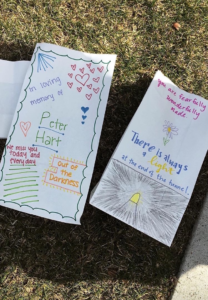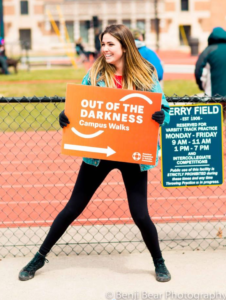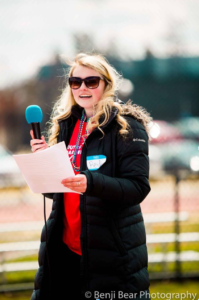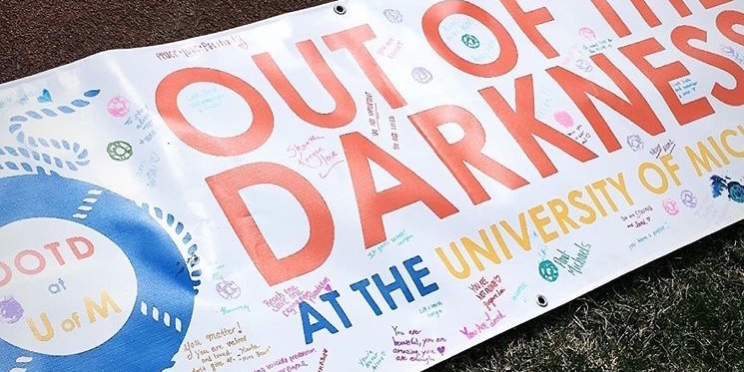This spring at the University of Michigan, it was more of a whirlwind than normal: our men’s basketball team made it to the final of the NCAA March Madness National Championship, and the campus was in a tumult of celebration and wild hope…until we lost to Villanova. Despite this, the Michigan head coach John Beilein made a huge impact before the game by speaking out on the impact mental health and well-being have: “I believe mental health affects everyone. Athletes are more in public view than ever before so they have a few extra things to think about,” said Beilein. These comments in the middle of March were just the beginning of a much larger conversation surrounding mental health here on campus.

At the end of March, I was fortunate enough to take part in the weeklong “Who Can Relate” event that aimed to open up the conversation on mental health and let students experience mental health challenges know they are not alone. Harris Schwartzberg, Michigan graduate and father of a current student, coordinated this event because of his personal connection to the cause. The event’s name came from something the rapper Logic said about ‘who can relate’ to mental health: that everyone’s answer is “I can relate.” Everyone is affected by mental health, whether through personal experience or being affected by the experience of a friend or loved one, and that’s why these conversations are so important.
One of the events I attended was a Youth Mental Health First Aid Training put on by Project 375, an organization started by Brandon Marshall, star NFL player, to educate and inspire people in the conversation on mental health. One of the biggest lessons I learned was the power that words can have, and the impact you can make in a person’s life just by being there.
The week concluded with a roundtable discussion between Dr. Alec Miller, Glenn Close, Michi and Brandon Marshall, Hakeem Rahim, and Peter Tunney. Everyone brought their own story and their own insight, creating an inspirational environment for all students to discuss our own stories. The final event of the week was a concert put on by Logic, the Grammy-nominated rapper known for his song, “1-800-273-8255”, which shines a spotlight on mental health and suicide prevention. I think what is so moving about seeing these prominent people focus on a cause like this is that it really makes ‘normal’ people realize they are not alone; if these successful public figures experience mental health challenges, just like college students do, it’s clear that it’s an issue for everyone to talk about, together.

I think I can safely say anyone involved in this week-long event would agree it was a success. It got students talking, it gave students an outlet, and it provided us with multiple resources available at our fingertips. However, despite the positivity and hope stemming from these events, students were also filled with sadness, grief, and confusion as we experienced a loss in our community this same week, as a University of Michigan senior died by suicide just days before this awareness event. It was hard to deal with as a community, especially with the school’s decision to not comment on her death.
To be able to move forward, we have to talk about these things. We have to be there for each other, and let each other know we are not alone.
This young woman’s family and friends, dealing traumatic loss, decided to join the conversation on mental health and the importance of suicide prevention by starting “Team Julia” for the University of Michigan Out of the Darkness Walk, an annual event aimed at suicide prevention. I have had the pleasure of working on the fundraising committee for our second annual Out of the Darkness Walk, which is put on with the guidance of the American Foundation for Suicide Prevention. The money we raise goes towards research, prevention and education, advocacy and public policy, and support for those who have lost someone to suicide. While we initially had the goal of raising $50,000, we eventually raised $103,000, the most of any college in the country. Even more inspiring, Team Julia was able to raise $38,000 in just over a week.

Almost a thousand people came together to honor loved ones lost to suicide, educate themselves on mental health through the many student organizations who worked tables at the event, and listen to Peter Ceglarek, who works with Healthy Minds Network. He opened the event urging everyone to act with love and compassion, and defy the silence by sharing your own story, and include everyone at the table in this conversation. We then walked a mile route, ending with hearing from a student speaker and very courageously, Julia’s mother. The emotions felt by the crowd were indescribable: a wave of sadness and sympathy, hearing a mother talk about losing her daughter to suicide, but also a wave of hope and healing, knowing there is such a strong community wanting to make a difference on this campus and in this world.
Going to a school with almost 30,000 undergraduates, it’s easy to feel lost sometimes, not valued, or alone. As a school community, we have a long way to go in addressing mental health, but I believe we are headed in the right direction. I know I am just one person, but I believe I can make a difference on this campus and beyond simply by sharing my story, by talking to someone, by being that resource for others, and by acting with love and compassion to everyone I encounter. You matter, and you are not alone.







